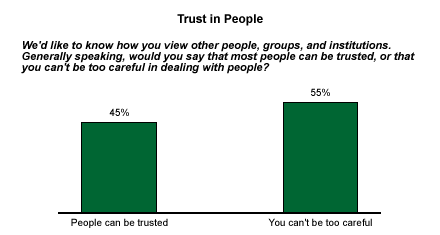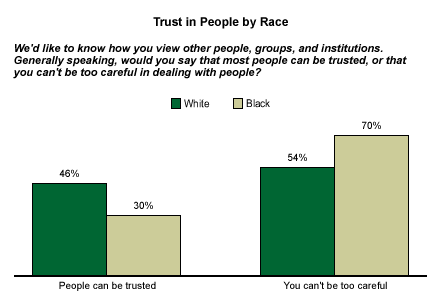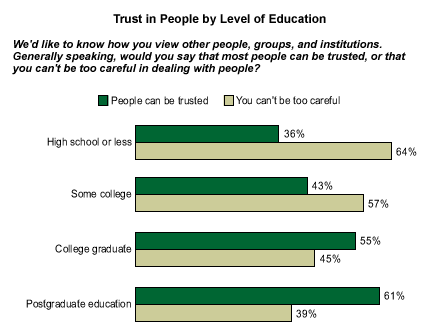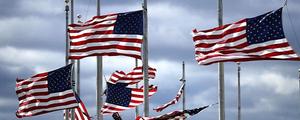Imagine standing on a table and falling backward into the arms of strangers. People who have attended summer camp or taken part in team-building workshops with colleagues may recognize this "trust fall" as a classic exercise designed to foster trust. According to a new Gallup Panel study*, most respondents would have trouble letting themselves fall off that table. Forty-five percent say most people can be trusted, but 55% say one can't be too careful.

This particular question has been asked by many different survey organizations over time. The results from the Gallup Panel survey show a slightly higher level of trust than do most recent data. For example, in a May 2005 Pew Internet and American Life Project survey, 32% of respondents said most people can be trusted. In a 2004 General Social Survey, 37% of respondents said this.
Race and Trust
Black respondents are significantly less trusting of people than are their white counterparts. Three in 10 blacks (30%) say most people can be trusted, as do 46% of whites.

Mistrust among U.S. blacks may be grounded in history. As President George W. Bush noted on Sept. 16 in his televised speech from New Orleans the "deep, persistent poverty" present in that region and many others "has roots in a history of racial discrimination, which cut off generations from the opportunity of America." Other survey research, including previous Gallup polling, suggests that nonwhites, in general, are less likely than whites to express trust in government officials and other people in certain roles.
Education and Trust
It appears that education may foster trust in others. Only 36% of respondents with a high school diploma or less say most people can be trusted, but that level of trust rises to 43% among those with some college education, 55% of college graduates, and 61% of those with postgraduate education. Less educated respondents -- who tend to have fewer resources, exposure, and job options -- may feel more vulnerable and therefore less trusting of others.

Does Religiosity Cede More Trust?
One might expect religious respondents to have more faith. Not so. Forty-five percent of the most frequent churchgoers -- those attending more than once a week -- say most people can be trusted, which is no different from the percentage of infrequent churchgoers who say so.
Bottom Line
In general, trust in one's fellow man appears to be lacking in America today. But what about trust in specific groups of people? As is often the case, perceptions are different when people are asked more specifically about their own lives. Next week, we will examine respondents' trust in their neighbors, local police, and shopkeepers.
*These results are based on mail and Web surveys with a randomly selected national sample of 11,849 adults in the Gallup Poll Panel of households, aged 18 and older, conducted June 21, 2005, to Aug. 3, 2005. For results based on this sample, one can say with 95% confidence that the maximum error attributable to sampling and other random effects is ±1 percentage point. In addition to sampling error, question wording and practical difficulties in conducting surveys can introduce error or bias into the findings of public opinion polls.
